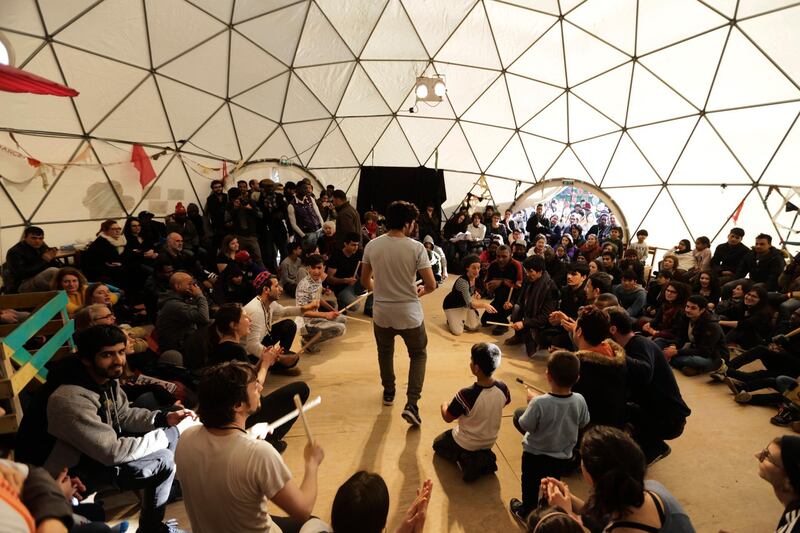Over deserts, mountains and treacherous seas, often at the mercy of cynical people smugglers, they journeyed in their thousands to escape conflict or to make better lives.
After reaching the southern tips of Europe, many migrants from Africa, the Middle East and Asia pressed on to the northern French port of Calais. For them, this was the final staging post en route to their chosen destination, the United Kingdom.
It was no El Dorado. The reality of life in the Jungle, as the squalid encampment became known, was grim. There was a daily cat-and-mouse game, migrants looking for ways to cross the English Channel, French and British authorities set on stopping them. But there was until the camp was cleared in 2016, a semblance of structured society, created by the migrants themselves with help from charitable locals, visiting volunteers and NGOs.
Among those striving to ease the grind of camp life were two young British playwrights who developed a lively theatre and arts centre in an 11-metre domed white tent. The impact of Good Chance, a project launched by Joe Robertson and Joe Murphy, was extraordinary. They used their experiences to write The Jungle, a critically acclaimed play that recently completed a six-week run at the Young Vic, a historic venue in London. And now, a second season of is harnessing the talents and enthusiasm of a new wave of migrants gathered in Paris.
“The Joes”, as Robertson and Murphy are known, cheerfully mocked themselves in the play with scenes, set in one of the Jungle’s many Afghan restaurants, depicting the naivety of do-gooders who poured into the camp with well-intentioned but sometimes ill-considered gestures. Even this has been turned to further advantage in Paris with a fashion show, inspired by bizarre items delivered to the Jungle by donors, planned for early March.
When warm or waterproof clothing was needed to counter the harsh Calais winter, some brought useless items including a wedding dress, hot pants and high-heeled shoes. "Our craft workshops will work on these ridiculous objects and come up with something light-hearted," says Robertson.
Despite their own self-conscious reservations about meddling in migrants’ lives, “the Joes” were convinced their work had value. “Throughout the seven months we spent in the Jungle, we knew we had an idea that could be developed and were determined to carry on when we returned to London,” Robertson says.
With the help of migrants who had reached Britain, they first staged a nine-day festival on the banks of the Thames. The play was the second of two theatrical productions to follow.
Good Chance aims to build temporary "theatres of hope promoting freedom of expression, creativity and dignity". Carey Mulligan, Juliet Stevenson and Sam West are among prominent figures from British cinema and stage to have been attracted to its work. It owes its name to a phrase used by Jungle inhabitants as they assessed the prospects for making the crossing. Each day was deemed a "good chance" day or "no chance" day for sneaking across to England.
Among the actors, artists and helpers drawn to the dome were migrants themselves. “We were in the midst of a crisis situation, working with people who would spend each night trying to jump on a train or lorry,” Robertson says. “At least our work gave them a chance of artistic expression.”
London and Paris were chosen as locations after Robertson and Murphy identified a need to collaborate with people trying to settle in big towns and cities. Over the past 15 months, migrants have been flocking into Paris at the rate of up to 100 a day.
“By contrast with Calais, it feels more settled, many of those already here having entered the asylum seeking process,” Robertson says.
Good Chance Paris is the product of a partnership with the French humanitarian charity Emmaüs Solidarité, which runs reception centres in and around the capital for migrants who would otherwise be abandoned to the streets. French theatres, performers and businesses are encouraged to take part, and Robertson says the response belies cold, unfriendly Parisian stereotypes.
Back in Calais, clearing the Jungle has not brought an end to one small town’s 20-year history of coping with a constant stream of migrants.
An estimated 1,000 are again living on the streets, in woodland and in makeshift shelters, lured by an exaggerated belief that applications for UK entry will be fast-tracked. Guns and wooden staves have been used in clashes between rival groups. "It is deeply sad," Robertson says.
Good Chance may not have solutions to the misery and despair that drive people to flee their native lands, or to the important issues of assimilation and security that confront reluctant host countries, but Robertson and Murphy believe it is a first step towards their declared mission "to offer relief in an expressive form for struggling people".
___________________
Read more:
[ The redemptive quality of remembering pain: art addressing the problems faced by Arab youth ]
[ Shouldn't we do more to promote storytelling traditions? ]
[ Written in Water’: An ancient Indian board game comes to life at NYUAD ]
___________________











